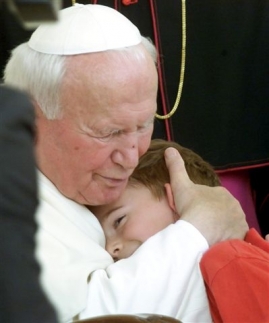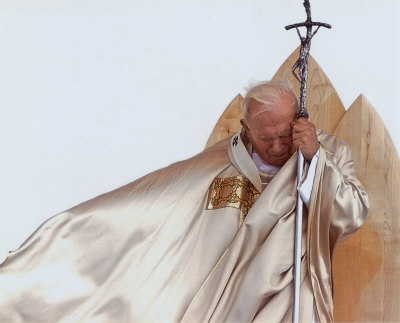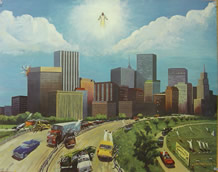In June 1991 John Paul II returned to his native Poland for the fourth time. The Wall had fallen, the soviet empire was in pieces. But the pope refused to celebrate. On the contrary, he had never before shown such angry with his compatriots. He gave a number of impromptu speeches, and from these words that were not recorded in writing, that were not filtered through diplomacy, his real thoughts burst forth. For example these, transcribed from an unofficial speech in Wloclwec:
“Giving in to desire, to sex, to consumption: that is the Europeanism that some supporters of our entry into Europe think we should accept. But we mustn’t become part of that Europe. We were the ones who created Europe, and with much more effort than those who claim exclusive rights to Europeanism. What is their criterion? Freedom. But which freedom? The freedom to take the life of an unborn child? Brothers and sisters, I protest against this concept of Europe held by the West. And this message must be shouted loudly from this land of martyrs. Europe is waiting for redemption. The world needs a redeemed Europe.”
Catholic Poland was a big disappointment to the first Polish pope in history. No sooner had it been liberated from communist domination that it fell prey to the evils of the West, to “freedom that creates slaves”.
From today’s NYTimes, a story on Poland’s “mall girl” culture, explored in a new film:
The film that started the discussion tells the story of four teenage girls who turn tricks in the restrooms of shopping malls to support their clothing addiction. It has attained such cult status that parents across the country say they are confiscating DVDs of the film for fear it provides a lurid instruction manual.
The revelation that Catholic girls, some from middle-class families, are prostituting themselves for a Chanel scarf or an expensive sushi dinner is causing many here to question whether materialism is polluting the nation’s soul.
In the film, the character Milena, the queen of the mall girls, explains to Ala, her innocent protégée, how to single out an affluent sponsor: “Look at a guy’s shoes, his watch, and his phone and you can tell if it’s expensive. It’s a start, right?” she says. Love doesn’t exist, she adds.
More:

Ms. Roslaniec [the filmmaker] called mall girls the daughters of capitalism. “Parents have lost themselves in the race after a new washing machine or car and are rarely home,” she said. “A 14-year-old girl needs a system of values that can’t be shaped without the guidance of parents. The result is that these girls live in a world where there are no feelings, just cold calculation.”
Roberto Suro, who covered the Pope for the Washington Post:
At the end of the day, when you look at this extraordinary life and you see all that he’s accomplished, all the lives he’s touched, the nations whose history he’s changed, the way he’s become such a powerful figure in our culture, in all of modern culture–among believers and not–taking all of that into account, you’re left with one very disturbing and difficult question. On the one hand, the Pope can seem this lonely, pessimisstic figure–a man who only sees the dark side of modernity, a man obsessed with the evils of the twentieth century, a man convinced that humankind has lost its way. A man so dark, so despairing, that he loses his audiences. That would make him a tragic figure, certainly.
On the other hand, you have to ask, is he a prophet? Did he come here with a message? Did he see something that many of us are missing? In that case, the tragedy is ours.


